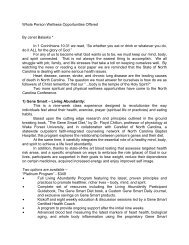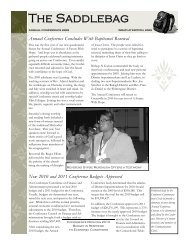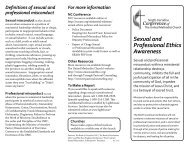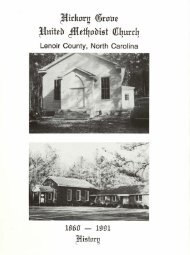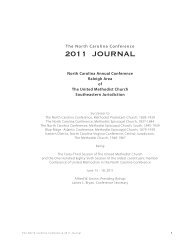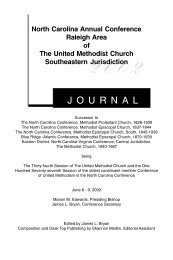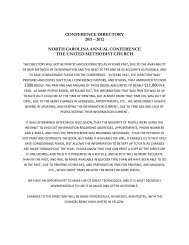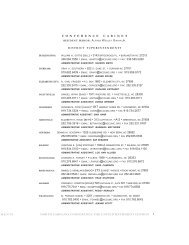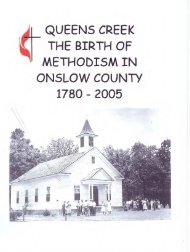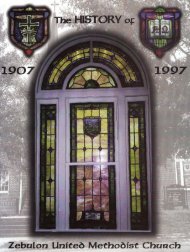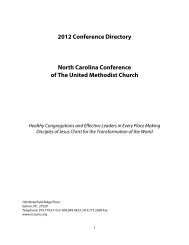- Page 1 and 2:
The North Carolina Conference 2012
- Page 3 and 4:
Preface iii A Future with Hope: Lov
- Page 5 and 6:
Preface v Rules of Order and Proced
- Page 7 and 8:
Preface vii Section Vii: Pastoral a
- Page 9 and 10:
Section i: Conference Officers and
- Page 11 and 12:
Section i: Conference Officers and
- Page 13 and 14:
Section i: Conference Officers and
- Page 15 and 16:
Section i: Conference Officers and
- Page 17 and 18:
Section i: Conference Officers and
- Page 19 and 20:
Section i: Conference Officers and
- Page 21 and 22:
Section i: Conference Officers and
- Page 23 and 24:
Section i: Conference Officers and
- Page 25 and 26:
Section i: Conference Officers and
- Page 27 and 28:
Section i: Conference Officers and
- Page 29 and 30:
Section ii Conference Organization
- Page 31 and 32:
Section ii: Conference Organization
- Page 33 and 34:
Section ii: Conference Organization
- Page 35 and 36:
Section ii: Conference Organization
- Page 37 and 38:
Section ii: Conference Organization
- Page 39 and 40:
Section ii: Conference Organization
- Page 41 and 42:
Section ii: Conference Organization
- Page 43 and 44:
Section ii: Conference Organization
- Page 45 and 46:
Section ii: Conference Organization
- Page 47 and 48:
Section ii: Conference Organization
- Page 49 and 50:
Section ii: Conference Organization
- Page 51 and 52:
Section ii: Conference Organization
- Page 53 and 54:
Section ii: Conference Organization
- Page 55 and 56:
Section ii: Conference Organization
- Page 57 and 58:
Section ii: Conference Organization
- Page 59 and 60:
Section ii: Conference Organization
- Page 61 and 62:
Section ii: Conference Organization
- Page 63 and 64:
Section ii: Conference Organization
- Page 65 and 66:
Section ii: Conference Organization
- Page 67 and 68:
Section ii: Conference Organization
- Page 69 and 70:
Section ii: Conference Organization
- Page 71 and 72:
Section ii: Conference Organization
- Page 73 and 74:
Section ii: Conference Organization
- Page 75 and 76:
Section ii: Conference Organization
- Page 77 and 78:
Section ii: Conference Organization
- Page 79 and 80:
Section ii: Conference Organization
- Page 81 and 82:
Section III: Conference Proceedings
- Page 83 and 84:
Section iii: Conference Proceedings
- Page 85 and 86:
Section iii: Conference Proceedings
- Page 87 and 88:
Section iii: Conference Proceedings
- Page 89 and 90:
Section iii: Conference Proceedings
- Page 91 and 92:
Section iii: Conference Proceedings
- Page 93 and 94:
Section iii: Conference Proceedings
- Page 95 and 96:
Section iii: Conference Proceedings
- Page 97 and 98:
Section iii: Conference Proceedings
- Page 99 and 100:
Section iii: Conference Proceedings
- Page 101 and 102:
Section iii: Conference Proceedings
- Page 103 and 104:
Section iii: Conference Proceedings
- Page 105 and 106:
Section iii: Conference Proceedings
- Page 107 and 108:
Section iii: Conference Proceedings
- Page 109 and 110:
Section iii: Conference Proceedings
- Page 111 and 112:
Section iii: Conference Proceedings
- Page 113 and 114:
Section iii: Conference Proceedings
- Page 115 and 116:
Section iii: Conference Proceedings
- Page 117 and 118:
Section iii: Conference Proceedings
- Page 119 and 120:
Section iii: Conference Proceedings
- Page 121 and 122:
Section iii: Conference Proceedings
- Page 123 and 124:
Section iii: Conference Proceedings
- Page 125 and 126:
Section iii: Conference Proceedings
- Page 127 and 128:
Section iii: Conference Proceedings
- Page 129 and 130:
Section iii: Conference Proceedings
- Page 131 and 132:
Section iii: Conference Proceedings
- Page 133 and 134:
Section iii: Conference Proceedings
- Page 135 and 136:
Section iii: Conference Proceedings
- Page 137 and 138:
Section iii: Conference Proceedings
- Page 139 and 140:
Section iii: Conference Proceedings
- Page 141 and 142:
Section iii: Conference Proceedings
- Page 143 and 144:
Section iii: Conference Proceedings
- Page 145 and 146:
Section iii: Conference Proceedings
- Page 147 and 148:
Section iii: Conference Proceedings
- Page 149 and 150:
Section iii: Conference Proceedings
- Page 151 and 152:
Section iii: Conference Proceedings
- Page 153 and 154:
Section iii: Conference Proceedings
- Page 155 and 156:
Section iii: Conference Proceedings
- Page 157 and 158:
Section iii: Conference Proceedings
- Page 159 and 160:
Section iii: Conference Proceedings
- Page 161 and 162:
Section iii: Conference Proceedings
- Page 163 and 164:
Section iii: Conference Proceedings
- Page 165 and 166:
Section iii: Conference Proceedings
- Page 167 and 168:
Section iii: Conference Proceedings
- Page 169 and 170:
Section iii: Conference Proceedings
- Page 171 and 172:
Section iii: Conference Proceedings
- Page 173 and 174:
Section iii: Conference Proceedings
- Page 175 and 176:
Section iii: Conference Proceedings
- Page 177 and 178:
Section iii: Conference Proceedings
- Page 179 and 180: Section iii: Conference Proceedings
- Page 181 and 182: Section iii: Conference Proceedings
- Page 183 and 184: Section iV: Legislation and Reports
- Page 185 and 186: Section iV: Legislation and Reports
- Page 187 and 188: Section iV: Legislation and Reports
- Page 189 and 190: Section iV: Legislation and Reports
- Page 191 and 192: Section iV: Legislation and Reports
- Page 193 and 194: Section iV: Legislation and Reports
- Page 195 and 196: Section iV: Legislation and Reports
- Page 197 and 198: Section iV: Legislation and Reports
- Page 199 and 200: Section iV: Legislation and Reports
- Page 201 and 202: Section iV: Legislation and Reports
- Page 203 and 204: Section iV: Legislation and Reports
- Page 205 and 206: Section iV: Legislation and Reports
- Page 207 and 208: Section iV: Legislation and Reports
- Page 209 and 210: Section iV: Legislation and Reports
- Page 211 and 212: Section iV: Legislation and Reports
- Page 213 and 214: Section iV: Legislation and Reports
- Page 215 and 216: Section iV: Legislation and Reports
- Page 217 and 218: Section iV: Legislation and Reports
- Page 219 and 220: Section iV: Legislation and Reports
- Page 221 and 222: Section iV: Legislation and Reports
- Page 223 and 224: Section iV: Legislation and Reports
- Page 225 and 226: Section iV: Legislation and Reports
- Page 227 and 228: Section iV: Legislation and Reports
- Page 229: Section iV: Legislation and Reports
- Page 233 and 234: Section iV: Legislation and Reports
- Page 235 and 236: Section iV: Legislation and Reports
- Page 237 and 238: Section iV: Legislation and Reports
- Page 239 and 240: Section iV: Legislation and Reports
- Page 241 and 242: Section iV: Legislation and Reports
- Page 243 and 244: Section iV: Legislation and Reports
- Page 245 and 246: Section iV: Legislation and Reports
- Page 247 and 248: Section iV: Legislation and Reports
- Page 249 and 250: Section iV: Legislation and Reports
- Page 251 and 252: Section iV: Legislation and Reports
- Page 253 and 254: Section iV: Legislation and Reports
- Page 255 and 256: Section iV: Legislation and Reports
- Page 257 and 258: Section iV: Legislation and Reports
- Page 259 and 260: Section iV: Legislation and Reports
- Page 261 and 262: Section iV: Legislation and Reports
- Page 263 and 264: Section iV: Legislation and Reports
- Page 265 and 266: Section iV: Legislation and Reports
- Page 267 and 268: Section iV: Legislation and Reports
- Page 269 and 270: Section iV: Legislation and Reports
- Page 271 and 272: Section iV: Legislation and Reports
- Page 273 and 274: Section iV: Legislation and Reports
- Page 275 and 276: Section V: Miscellaneous Reports Co
- Page 277 and 278: Section V: Miscellaneous Reports 26
- Page 279 and 280: Section V: Miscellaneous Reports 27
- Page 281 and 282:
Section V: Miscellaneous Reports 27
- Page 283 and 284:
Section V: Miscellaneous Reports 27
- Page 285 and 286:
Section V: Miscellaneous Reports 27
- Page 287 and 288:
Section V: Miscellaneous Reports 27
- Page 289 and 290:
Section V: Miscellaneous Reports 28
- Page 291 and 292:
Section V: Miscellaneous Reports 28
- Page 293 and 294:
Section V: Miscellaneous Reports 28
- Page 295 and 296:
Section V: Miscellaneous Reports 28
- Page 297 and 298:
Section V: Miscellaneous Reports 28
- Page 299 and 300:
Section V: Miscellaneous Reports 29
- Page 301 and 302:
Section Vi: Historical Records È M
- Page 303 and 304:
Section Vi: Historical Records 295
- Page 305 and 306:
Section Vi: Historical Records 297
- Page 307 and 308:
Section Vi: Historical Records 299
- Page 309 and 310:
Section Vi: Historical Records 301
- Page 311 and 312:
Section Vi: Historical Records 303
- Page 313 and 314:
Section Vi: Historical Records 305
- Page 315 and 316:
Section Vi: Historical Records 307
- Page 317 and 318:
Section Vi: Historical Records 309
- Page 319 and 320:
Section Vi: Historical Records 311
- Page 321 and 322:
Section Vi: Historical Records 313
- Page 323 and 324:
Section Vi: Historical Records 315
- Page 325 and 326:
Section Vi: Historical Records 317
- Page 327 and 328:
Section Vi: Historical Records 319
- Page 329 and 330:
Section Vi: Historical Records 321
- Page 331 and 332:
Section Vi: Historical Records 323
- Page 333 and 334:
Section Vi: Historical Records 325
- Page 335 and 336:
Section Vii: Pastoral and Diaconal
- Page 337 and 338:
Section Vii: Pastoral and Diaconal
- Page 339 and 340:
Section Vii: Pastoral and Diaconal
- Page 341 and 342:
Section Vii: Pastoral and Diaconal
- Page 343 and 344:
Section Vii: Pastoral and Diaconal
- Page 345 and 346:
Section Vii: Pastoral and Diaconal
- Page 347 and 348:
Section Vii: Pastoral and Diaconal
- Page 349 and 350:
Section Vii: Pastoral and Diaconal
- Page 351 and 352:
Section Vii: Pastoral and Diaconal
- Page 353 and 354:
Section Vii: Pastoral and Diaconal
- Page 355 and 356:
Section Vii: Pastoral and Diaconal
- Page 357 and 358:
Section Vii: Pastoral and Diaconal
- Page 359 and 360:
Section Vii: Pastoral and Diaconal
- Page 361 and 362:
Section Vii: Pastoral and Diaconal
- Page 363 and 364:
Section Vii: Pastoral and Diaconal
- Page 365 and 366:
Section Vii: Pastoral and Diaconal
- Page 367 and 368:
Section Vii: Pastoral and Diaconal
- Page 369 and 370:
Section Vii: Pastoral and Diaconal
- Page 371 and 372:
Section Vii: Pastoral and Diaconal
- Page 373 and 374:
Section Vii: Pastoral and Diaconal
- Page 375 and 376:
Section Vii: Pastoral and Diaconal
- Page 377 and 378:
Section Vii: Pastoral and Diaconal
- Page 379 and 380:
Section Vii: Pastoral and Diaconal
- Page 381 and 382:
Section Vii: Pastoral and Diaconal
- Page 383 and 384:
Section Vii: Pastoral and Diaconal
- Page 385 and 386:
Section Vii: Pastoral and Diaconal
- Page 387 and 388:
Section Vii: Pastoral and Diaconal
- Page 389 and 390:
Section Vii: Pastoral and Diaconal
- Page 391 and 392:
Section Vii: Pastoral and Diaconal
- Page 393 and 394:
Section Vii: Pastoral and Diaconal
- Page 395 and 396:
Section Vii: Pastoral and Diaconal
- Page 397 and 398:
Section Vii: Pastoral and Diaconal
- Page 399 and 400:
Section Vii: Pastoral and Diaconal
- Page 401 and 402:
Section Vii: Pastoral and Diaconal
- Page 403 and 404:
Section Vii: Pastoral and Diaconal
- Page 405 and 406:
Section Vii: Pastoral and Diaconal
- Page 407 and 408:
Section Vii: Pastoral and Diaconal
- Page 409 and 410:
Section Vii: Pastoral and Diaconal
- Page 411 and 412:
Section Vii: Pastoral and Diaconal
- Page 413 and 414:
Section Viii: Financial Reports & L
- Page 415 and 416:
Section Viii: Financial Reports & L
- Page 417 and 418:
Section Viii: Financial Reports & L
- Page 419 and 420:
Section Viii: Financial Reports & L
- Page 421 and 422:
Section Viii: Financial Reports & L
- Page 423 and 424:
Burlington District - Table II Burl
- Page 425 and 426:
Section Viii: Financial Reports & L
- Page 427 and 428:
Burlington District - Table II Burl
- Page 429 and 430:
Section Viii: Financial Reports & L
- Page 431 and 432:
Burlington District - Table III Bur
- Page 433 and 434:
Burlington District - Table III Bur
- Page 435 and 436:
Durham District - Table I Durham Di
- Page 437 and 438:
Section Viii: Financial Reports & L
- Page 439 and 440:
Durham District - Table I Durham Di
- Page 441 and 442:
Section Viii: Financial Reports & L
- Page 443 and 444:
Durham District - Table II Durham D
- Page 445 and 446:
Section Viii: Financial Reports & L
- Page 447 and 448:
Durham District - Table II Durham D
- Page 449 and 450:
Section Viii: Financial Reports & L
- Page 451 and 452:
Section Viii: Financial Reports & L
- Page 453 and 454:
Section Viii: Financial Reports & L
- Page 455 and 456:
Section Viii: Financial Reports & L
- Page 457 and 458:
Section Viii: Financial Reports & L
- Page 459 and 460:
Section Viii: Financial Reports & L
- Page 461 and 462:
Section Viii: Financial Reports & L
- Page 463 and 464:
Elizabeth City District - Table II
- Page 465 and 466:
Section Viii: Financial Reports & L
- Page 467 and 468:
Elizabeth City District - Table II
- Page 469 and 470:
Section Viii: Financial Reports & L
- Page 471 and 472:
Section Viii: Financial Reports & L
- Page 473 and 474:
Section Viii: Financial Reports & L
- Page 475 and 476:
Fayetteville District - Table I Fay
- Page 477 and 478:
Fayetteville District - Table I Fay
- Page 479 and 480:
Section Viii: Financial Reports & L
- Page 481 and 482:
Fayetteville District - Table I Fay
- Page 483 and 484:
Fayetteville District - Table I Fay
- Page 485 and 486:
Section Viii: Financial Reports & L
- Page 487 and 488:
Fayetteville District - Table II Fa
- Page 489 and 490:
Section Viii: Financial Reports & L
- Page 491 and 492:
Fayetteville District - Table II Fa
- Page 493 and 494:
Section Viii: Financial Reports & L
- Page 495 and 496:
Section Viii: Financial Reports & L
- Page 497 and 498:
Section Viii: Financial Reports & L
- Page 499 and 500:
Goldsboro District - Table I Goldsb
- Page 501 and 502:
Section Viii: Financial Reports & L
- Page 503 and 504:
Goldsboro District - Table I Goldsb
- Page 505 and 506:
Section Viii: Financial Reports & L
- Page 507 and 508:
Goldsboro District - Table II Golds
- Page 509 and 510:
Section Viii: Financial Reports & L
- Page 511 and 512:
Goldsboro District - Table II Golds
- Page 513 and 514:
Section Viii: Financial Reports & L
- Page 515 and 516:
Section Viii: Financial Reports & L
- Page 517 and 518:
Section Viii: Financial Reports & L
- Page 519 and 520:
Greenville District - Table I Green
- Page 521 and 522:
Greenville District - Table I Green
- Page 523 and 524:
Greenville District - Table I Green
- Page 525 and 526:
Greenville District - Table I Green
- Page 527 and 528:
Section Viii: Financial Reports & L
- Page 529 and 530:
Section Viii: Financial Reports & L
- Page 531 and 532:
Section Viii: Financial Reports & L
- Page 533 and 534:
Section Viii: Financial Reports & L
- Page 535 and 536:
Section Viii: Financial Reports & L
- Page 537 and 538:
Section Viii: Financial Reports & L
- Page 539 and 540:
New Bern District - Table I New Ber
- Page 541 and 542:
New Bern District - Table I New Ber
- Page 543 and 544:
New Bern District - Table I New Ber
- Page 545 and 546:
New Bern District - Table I New Ber
- Page 547 and 548:
New Bern District - Table II New Be
- Page 549 and 550:
Section Viii: Financial Reports & L
- Page 551 and 552:
New Bern District - Table II New Be
- Page 553 and 554:
Section Viii: Financial Reports & L
- Page 555 and 556:
Section Viii: Financial Reports & L
- Page 557 and 558:
Section Viii: Financial Reports & L
- Page 559 and 560:
Raleigh District - Table I Raleigh
- Page 561 and 562:
Raleigh District - Table I Raleigh
- Page 563 and 564:
Section Viii: Financial Reports & L
- Page 565 and 566:
Raleigh District - Table I Raleigh
- Page 567 and 568:
Raleigh District - Table I Raleigh
- Page 569 and 570:
Section Viii: Financial Reports & L
- Page 571 and 572:
Raleigh District - Table II Raleigh
- Page 573 and 574:
Raleigh District - Table II Raleigh
- Page 575 and 576:
Raleigh District - Table II Raleigh
- Page 577 and 578:
Raleigh District - Table II Raleigh
- Page 579 and 580:
Raleigh District - Table III Raleig
- Page 581 and 582:
Raleigh District - Table III Raleig
- Page 583 and 584:
Rockingham District - Table I Rocki
- Page 585 and 586:
Rockingham District - Table I Rocki
- Page 587 and 588:
Rockingham District - Table I Rocki
- Page 589 and 590:
Rockingham District - Table I Rocki
- Page 591 and 592:
Rockingham District - Table II Rock
- Page 593 and 594:
Section Viii: Financial Reports & L
- Page 595 and 596:
Rockingham District - Table II Rock
- Page 597 and 598:
Section Viii: Financial Reports & L
- Page 599 and 600:
Section Viii: Financial Reports & L
- Page 601 and 602:
Section Viii: Financial Reports & L
- Page 603 and 604:
Rocky Mount District - Table I Rock
- Page 605 and 606:
Section Viii: Financial Reports & L
- Page 607 and 608:
Rocky Mount District - Table I Rock
- Page 609 and 610:
Section Viii: Financial Reports & L
- Page 611 and 612:
Rocky Mount District - Table II Roc
- Page 613 and 614:
Section Viii: Financial Reports & L
- Page 615 and 616:
Rocky Mount District - Table II Roc
- Page 617 and 618:
Section Viii: Financial Reports & L
- Page 619 and 620:
Section Viii: Financial Reports & L
- Page 621 and 622:
Section Viii: Financial Reports & L
- Page 623 and 624:
Sanford District - Table I Sanford
- Page 625 and 626:
Sanford District - Table I Sanford
- Page 627 and 628:
Sanford District - Table I Sanford
- Page 629 and 630:
Sanford District - Table I Sanford
- Page 631 and 632:
Sanford District - Table II Sanford
- Page 633 and 634:
Section Viii: Financial Reports & L
- Page 635 and 636:
Sanford District - Table II Sanford
- Page 637 and 638:
Section Viii: Financial Reports & L
- Page 639 and 640:
Section Viii: Financial Reports & L
- Page 641 and 642:
Section Viii: Financial Reports & L
- Page 643 and 644:
Wilmington District - Table I Wilmi
- Page 645 and 646:
Section Viii: Financial Reports & L
- Page 647 and 648:
Section Viii: Financial Reports & L
- Page 649 and 650:
Wilmington District - Table I Wilmi
- Page 651 and 652:
Section Viii: Financial Reports & L
- Page 653 and 654:
Section Viii: Financial Reports & L
- Page 655 and 656:
Wilmington District - Table II Wilm
- Page 657 and 658:
Section Viii: Financial Reports & L
- Page 659 and 660:
Wilmington District - Table II Wilm
- Page 661 and 662:
Section Viii: Financial Reports & L
- Page 663 and 664:
Wilmington District - Table III Wil
- Page 665 and 666:
Wilmington District - Table III Wil
- Page 667 and 668:
Section Viii: Financial Reports & L
- Page 669 and 670:
Section Viii: Financial Reports & L
- Page 671 and 672:
Section Viii: Financial Reports & L
- Page 673 and 674:
Section Viii: Financial Reports & L
- Page 675 and 676:
index 667 2012 Journal Index 3MC Mi
- Page 677 and 678:
index 669 Historical Statement, 325
- Page 679:
index 671 W Wake Forest Wesley Foun




